Heffron Consulting managing director, Meg Heffron, told delegates that “members should take a deep breath before taking any precipitous action if the proposed legislation becomes law”.
“Although our impacted clients would prefer this new tax would disappear, it’s not a disaster and clients shouldn’t remove excess amounts from super without careful consideration,” she said.
Ms Heffron said reaching $3 million in superannuation was much harder than it used to be and that many clients will never get there and still gain value from their SMSF.
In her firm’s client base, she said that around 43 per cent have less than $3 million and are over 65 meaning their peak savings years have passed.
“If people choose to take their money out of superannuation, there are important issues to consider including the impact of large withdrawals on exempt current pension income (ECPI), not wasting losses and/or negative earnings, and any tax on death benefits,” she said.
In his opening address at the conference on Wednesday, SMSF Association CEO, Peter Burgess, told delegates they could expect the $3 million cap to become law by 30 June this year.
“The only question that remains is whether the government’s proposal not to index the cap and to tax unrealised capital gains will survive the scrutiny of the Senate crossbench,” he said.
“Although there might not be sufficient crossbench support to block this Bill, we hope that they will support amendments which simplify and improve this tax.”
Mr Burgess added indexation of the $3 million cap could easily be added and the proposed calculation of earnings could be simplified, and the taxation of unrealised capital gains substantially removed, by replacing the proposed complex formula and system of carried forward negative earnings, with a rate which more closely resembles taxable earnings.
“Our modelling shows that if the 90-day bank bill rate was used to calculate earnings, over the medium to long term, not only would taxpayers pay substantially less tax, but their tax liability from one year to the next is much smoother and far less erratic than the government’s proposed approach,” he said.
“Paying less tax was an outcome even if you choose a 15-year period over the past 30 years when there were successive years of negative returns which under the Government’s proposed approach could be carried forward and used to offset the tax in a future year.”



I have voted for labour at times in the past when the whiff of corruption-by-power from the coalition became too much to ignore, but, as with 296 and broken tax promise, it takes only a single term in office for me to remember why I must never vote for them again. An example of insanity runs ‘doing the same thing repeatedly and expecting a different result’. Shame on me.
From the moment when the Albo government adjusted the stage 3 tax cut, I knew I should just follow the flow.
I feel confident that most people don’t understand the real significance of this ‘levy’.
It isn’t a superannuation tax and it isn’t an income tax. It can easily be broadened to encompass all assets. The value of the assets are determined by others. The change in value could be a recovery of losses existing at the time the ‘levy’ commences in July 2025.
It is a very dangerous precedent and is inconsistent with all existing income taxes.
Look out property investors and primary producers you are most likely on the radar.
It should be rejected by the senate.
The other thing that is very unfair for self-funded retirees is the way the transfer balance cap is calculated. Where is the logic that each person has a different cap. The cap should be adjusted by the CPI regardless of how much and when it has been used. Inflation affects us all regardless of when the pension commenced.
Government funded pensions are adjusted automatically. The purchasing power of self-funded pensions also lose puchasing power.
I now question why I have worked and saved hard all my life to be financially independent.